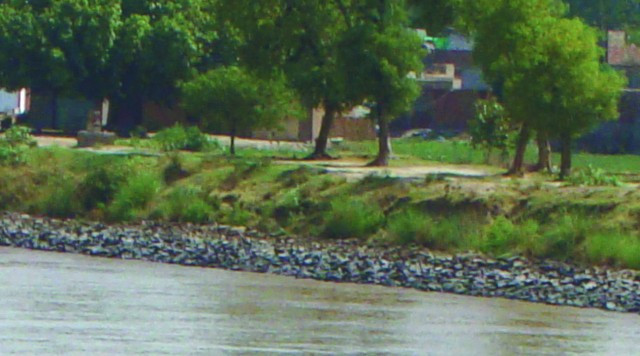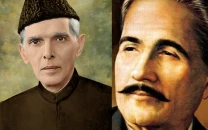Everything but the militia
I am worried about how the government is portraying the image of Punjab...

My trip there — my first incidentally — was for a documentary I was producing on local household alcohol production. I was tipped off to travel to interior Punjab, some 200 kilometres outside Lahore. My co-worker, whose ancestral home was there, had set up my co-ordinates without disclosing the location of my destination. It all sounded a bit dodgy, and I was skeptical to begin with that alcohol producers would be flourishing amongst madrassahs spewing out extremists in just that vicinity.
After a journey of two hours, my co-worker met me at a nondescript spot where I was told to follow the car. We drove down a narrow road flanked by fields on either side, and in time, came to another parked car — a white 96 Corolla. There was a hefty looking gentleman at the wheel whom I was informed was the contact. We followed him for another ten minutes till we reached a deserted doorway. He drove in and we followed.
This was his ‘dera’, I was told. Made of mud bricks, two rooms and a dusty sitting area, the place looked haunted even in broad daylight. After being seated, I was introduced to the man from the Corolla. He was the ex-mayor of the village and was from a prominent political party in the province. And he was going to take us to the alcohol producer-cum-vendor.
“What will you do with this story?” he asked me.
I told him that I had set out to change Pakistan’s image and show people that it wasn’t all terrorism, like the government and foreign media seemed to think. He nodded and signalled to his servants to bring refreshments. After a hospitable round of lassi, we were asked to follow him in our cars. At the end of a long winding road, we came to a red-bricked locality. He parked in front of a house and got out, telling us to follow him into the gate. When we entered, we were seated on two charpoys. Presently, a man in his late thirties came out of the house and greeted us. He was introduced as the head of operations, and he welcomed us into his house and introduced us to his wife and five children, who seemed quite fascinated by our arrival.
Getting straight down to business, the distiller asked us to join him in his kitchen, which doubled as his production room, where he kept the matka-distillation machine. At the bottom of the machine was a gas oven, above which was a matka filled with water. The middle matka contained the alcohol mix, and the top bowl was filled with cold water.
“The process is quite simple,” he said. “All you need is a good mixture that readies in two weeks. How the mixture is made I will explain later, but for now let me take you through the process of condensation.” Pointing to the middle mud plate, he added, “When we light the oven, the alcohol will condense and drop out of the pipe that is sticking out.”
After explaining the method, he took some pre-made mixture and, like a science teacher, went through the condensation process. The mixture was of three basic ingredients, water, brown sugar (gurh), and a tree known as kikar’s bark.
“Add all three ingredients into the matka, with kilos of gurh increasing in proportion to the litres of alcohol required,” he explained, “and then bury the matka in a field for two weeks.”
A customer turned up while he was speaking to us, at which point the gentleman excused himself to attend to business. Distiller and buyer nipped into a room and two minutes later, one happy customer left the house with a plastic bag filled with alcohol. The transaction cost three hundred rupees.
When asked if the illegality of his operations troubled him, the distiller replied that this was his livelihood which more than justified doing it. He laughingly added, “I have been caught by the police, and was kept in custody for over a month very recently.”
“So how did you get out?” I inquired.
He took out the notes he had just been handed by the buyer and said, “Quaid-e-Azam Zindabad.”
After bidding farewell to the alcohol businessman as he called himself, we headed out. Our next stop was the fields where the matkas are buried. After driving for a bit, we were asked to park in front of a path leading right into the heart of a plantation. I got out and followed. A mud house appeared before us, and out came a farmer, who, after a chat, told me to follow him behind the house, where we found a pile of cow dung. The farmer started digging into the manure with his bare hands and pulled out a matka covered with a lid. It had been fermenting for 10 days so it had a fairly pronounced odour. I asked him how clean this method was to which he replied that he’d been at it for some 15 years and no one’s health had been tainted by it yet.
We were told that this matka was for the farmer’s personal consumption. There were numerous households in this village that preferred to brew alcohol in their backyards.
We bid farewell to him and headed out of the fields.
“Is there anything rare about this alcohol?” I asked my local contact.
“Not as such. The sugar cane for the gurh is homegrown so it’s not a problem, and water is ample in supply owing to the village’s large canal network.”
“So is it the tree that is a scarce resource?” I inquired.
To prove that it was not he took me to a nearby canal tributary and both sides of which were lined with trees of this particular kind.
“The kikar tree grows throughout Punjab’’, he told me.
We had seen it all and it was time to go back. Jokingly I asked one of the locals about the presence of the Taliban in these areas, to which he smiled and said, “There are no extremists here in our community. Didn’t you notice? We are just a bunch of farmers having fun…’’
Published in The Express Tribune, June 27th, 2010.



















COMMENTS
Comments are moderated and generally will be posted if they are on-topic and not abusive.
For more information, please see our Comments FAQ